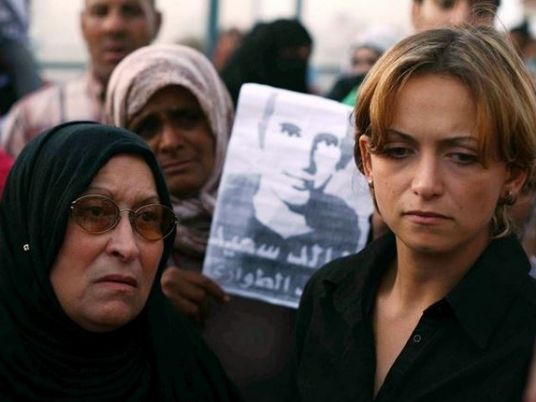The trial of the two secret policemen who eyewitnesses say beat 28-year-old Alexandrian Khaled Saeed to death last month makes headlines today on the front pages of most independent newspapers, but receives less attention in state-aligned papers.
Independent coverage focuses on the fact that pro-Saeed protesters, who rallied outside Alexandria’s criminal court bearing black banners saying “The murderers should be killed,” were surrounded by hundreds of riot police. Al-Shorouq writes of “clashes during the first hearing of Khaled Saeed’s case,” referring to police attempts to drive protesters away after the trial was adjourned until 25 September. Surprisingly, Al-Shorouq makes no mention of a crowd–claimed by some to have been made up of plainclothes police–who stood outside the court raising banners and chanting slogans in support of the police.
State-owned Al-Akhbar dedicates a small box at the bottom of its front page to the trial. The paper runs two photos alongside the story: one featuring the two defendants standing behind bars, and another showing pro-regime demonstrators outside the court. The demonstrators are shown raising banners reading: “The police is not the enemy; Kefaya and others are agents of foreign powers… Wake up young Egyptians!” There is no photo of the pro-Saeed protestors. Al-Ahram, another government-run newspaper, contents itself with running a two-line teaser on the front page with news that the trial has been adjourned. The full story is relegated to page 32.
Like most state-owned papers, Al-Ahram is instead busy today with coverage of Egyptian diplomacy. Both Al-Ahram and Al-Akhbar have curtain-raiser stories on their front pages about a meeting today in the Red Sea resort of Sharm el-Sheikh between Egyptian President Hosni Mubarak and Saudi King Abdullah Ibn Abdel Aziz, who are expected to discuss key regional issues including the Middle East peace process, internal feuds in Lebanon, and the Iranian nuclear portfolio.
The closing of the African summit also occupies major space in today’s government-owned papers, who all stress “the success of Egyptian diplomacy” in convincing African leaders to sign off on an Egyptian-drafted resolution stating that human rights values should not violate local and regional cultures.
Whereas the official press celebrates Egypt’s role in the region, Al-Dostour raises a sensitive issue that Egyptian politicians consider a red line. The weekly edition of the privately-owned paper leads with a sensational headline intimating that the regime should look into abrogating its peace treaty with Israel. The paper quotes experts as saying that the Egyptian-Israeli peace agreement signed in 1979 should be considered obsolete, as Israel has already violated all its provisions.
Besides Egypt’s foreign affairs, Al-Dostour devotes several pages to pressing local issues. It has a two-page reportage on the door-knocking campaign initiated by former head of the UN nuclear watchdog Mohamed ElBaradei. The story includes lengthy interviews with young men and women who are traveling the country to collect signatures in support of ElBaradei’s reform demands.
The headline quotes the campaigners as saying: “As soon as we collect one million signatures, we will take to the streets along with ElBaradei.” ElBaradei’s association is calling for the state of emergency to be lifted and the Constitution amended to allow multiple candidates to run in next year’s presidential elections.
Also on the subject of elections, Al-Dostour dedicates another two pages to map out the electoral plans of different opposition parties for the upcoming parliamentary elections set for October. The report focuses primarily on candidates from the Muslim Brotherhood and the liberal Wafd Party.




